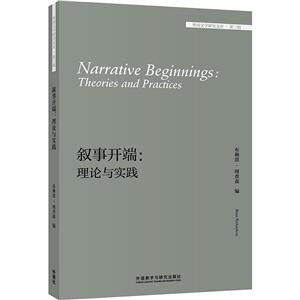-
>
鲍勃·迪伦诗歌集:1961-2012:典藏版
-
>
双城记-英文版
-
>
四级词汇词根+联想记忆法:乱序版
-
>
The secret garden
-
>
哈克贝利.费恩历险记/床头灯英语.2000词读物(英汉对照)
-
>
10000德语分类词汇联想记忆
-
>
英语词汇全书
外国文学研究文库叙事开端:理论与实践/外国文学研究文库第3辑 版权信息
- ISBN:9787521320565
- 条形码:9787521320565 ; 978-7-5213-2056-5
- 装帧:一般胶版纸
- 册数:暂无
- 重量:暂无
- 所属分类:>
外国文学研究文库叙事开端:理论与实践/外国文学研究文库第3辑 本书特色
适读人群 :学生,教师,一般读者《叙事开端:理论与实践》是“外国文学研究文库”系列第三辑的一本。该系列旨在将国外的文学学界的学术成果及时引进和介绍给我国外国文学学者、学生及爱好者,反映外国文学研究领域在世界范围的发展趋势与前沿探索。 “外国文学研究文库”英文书以原版的形式、非英文书以译本的形式出版,并辅之以国内这一领域的资深学者撰写的导读,帮助读者把握作品的脉络,掌握其思想要点,更全面、更深入地理解作品要义。
外国文学研究文库叙事开端:理论与实践/外国文学研究文库第3辑 内容简介
开端、副文本与文化原型分别指什么? 叙事文学如何开端? 开端与结尾又是什么关系? …… 《叙事开端:理论与实践/外国文学研究文库·第三辑》既论述了叙事作品开端的一般规律,又列举其体现在具体作品中的特殊表现,从开端的形式美学到隐含其中的文化历史意蕴,为读者呈现了关于开端的新研究成果。
外国文学研究文库叙事开端:理论与实践/外国文学研究文库第3辑 目录
外国文学研究文库叙事开端:理论与实践/外国文学研究文库第3辑 节选
《叙事开端:理论与实践/外国文学研究文库·第三辑》: This selection then combines with our tendency to segment and structure causes in terms of malevolent or benevolent intentions, with some bias toward malevolent categorization. One result is the common specification of narrative beginnings in terms of malevolent actions. We find this to some degree in the standard beginnings for all three cross-cultural narrative prototypes: romantic, heroic, and sacrificial tragicomic.12 For example, in the standard romantic plot, the lovers are initially separated by an interfering parent. For our purposes, the most important of these three prototypes is the heroic, because our employment of wars is precisely an employment in terms of the heroic prototype. That prototype manifests the malevolent initiating moment most starkly. Moreover, it synthesizes our tendency to view causality as dispositional (i.e., to understand it in terms of benevolence or malevolence) with our parallel tendency to categorize human agents into in-groups and out-groups. Specifically, it sets out a malevolent attack by an out-group-usually an invasion by a foreign power-as the absolute and singular origin of the central narrative conflict. Beyond these matters, which bear directly on narrative beginnings, our cognitive dispositions have other consequences for our (narrative) understanding of and response to war as well. One result is that we tend to experience our own emotionally guided response to the "initiating event" as compelled by the event, thus not morally blameworthy. This is particularly true when we have no attentional focus on the harmful consequences of our acts (e.g., enemy casualties that would trigger empathy by way of mirror neurons). In contrast, we tend to see the malevolent actions of the out-group as chosen. They are not caused by prior events, but rather derive from group properties. Thus their actions are not only immoral in themselves but reveal an underlying immorality of shared character (racial, cultural, religious, national, or whatever). A second result is that arguments against absolute and singular origins for conflict strike us as similar to the arguments of out-groups. Specifically, we tend to categorize such arguments as positing a different origin for conflict rather than as disputing origins per se. Because of the cognitive and affective constraints on our spontaneous causal understandings, we readily assimilate such arguments to justifications for the out-group actions. Simplifying somewhat, we might say that our spontaneous causal attributions give us two obvious alternatives our own version of causal attribution and a parallel version offered by the out-group. If these are the two options, then any argument that is not of the former sort would seem to be of the latter sort. Of course, in many cases, attacks on antiwar arguments are duplicitous. Politicians know perfectly well that, for example, antiwar protestors are not supporters of Saddam Hussein. However, the point is that the objective illogic of their objections to protestors can be broadly persuasive due to our cognitive propensities. The preceding point is enhanced by a final consequence of human emotion; specifically, insofar as they involve strong emotions, our spontaneous attributions of causality may remain at least partially impervious to our knowledge about actual causal relations. In other words, our emotion system may continue to spontaneously project a single, absolute, malevolent origin to conflict, even when higher cortical systems have inferred that this is not the case. Again, this results from two complementary factors. First, our emotional responses may usurp working memory, thus the very inferential processes that should inhibit our spontaneous causal attributions. Second, our lack of emotional involvement with alternative analyses (e.g., our lack of emotional involvement with the projected causal agents, thus the out-group) means that these alternative analyses receive no further attentional focus or elaboration and thus are unlikely to engage inhibitory processes. ……
外国文学研究文库叙事开端:理论与实践/外国文学研究文库第3辑 作者简介
作者,布赖恩·理查森(Brian Richardson)是美国马里兰大学的英文教授,非自然叙事研究的奠基人,撰写和编著《非自然声音:现当代小说中的极端叙事》等多部作品。 主编简介 金莉:北京外国语大学教授、博导,文学博士。研究领域为美国小说与美国女性文学。目前担任北外王佐良外国文学高等研究院院长和《外国文学》杂志主编。主要著作包括《文学女性与女性文学》《20世纪美国女性小说研究》《当代美国女权文学批评家研究》,并发表论文多篇。
- >
苦雨斋序跋文-周作人自编集
苦雨斋序跋文-周作人自编集
¥6.9¥16.0 - >
二体千字文
二体千字文
¥16.0¥40.0 - >
罗庸西南联大授课录
罗庸西南联大授课录
¥13.8¥32.0 - >
罗曼·罗兰读书随笔-精装
罗曼·罗兰读书随笔-精装
¥40.6¥58.0 - >
随园食单
随园食单
¥26.9¥48.0 - >
伊索寓言-世界文学名著典藏-全译本
伊索寓言-世界文学名著典藏-全译本
¥6.1¥19.0 - >
【精装绘本】画给孩子的中国神话
【精装绘本】画给孩子的中国神话
¥17.6¥55.0 - >
龙榆生:词曲概论/大家小书
龙榆生:词曲概论/大家小书
¥9.1¥24.0
-
2022图书×抽奖盲袋
¥9.9¥25 -
2023读书月阅读盲盒——天黑,闭眼,刀谁?
¥42.3¥158 -
2022读者节纪念徽章-三星会员专属
¥45¥45.6 -
2023读书月阅读盲盒——我什么场面没见过?
¥42.3¥158 -
2023读书月阅读盲盒——去码头整点什么薯条?
¥42.3¥158















